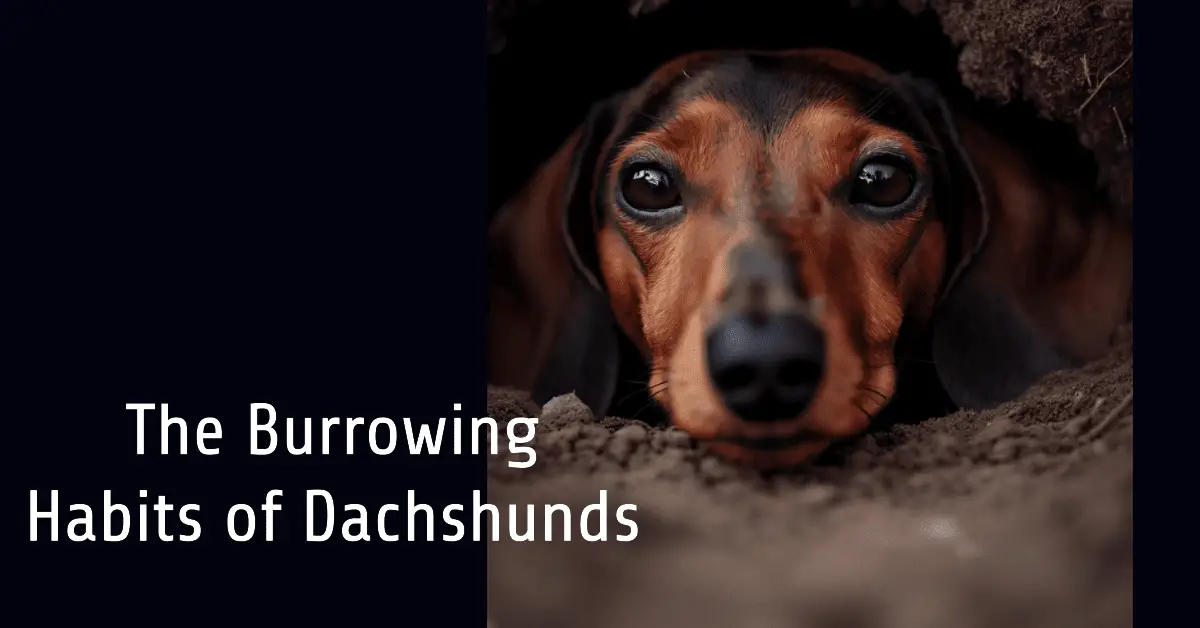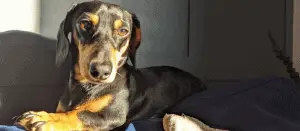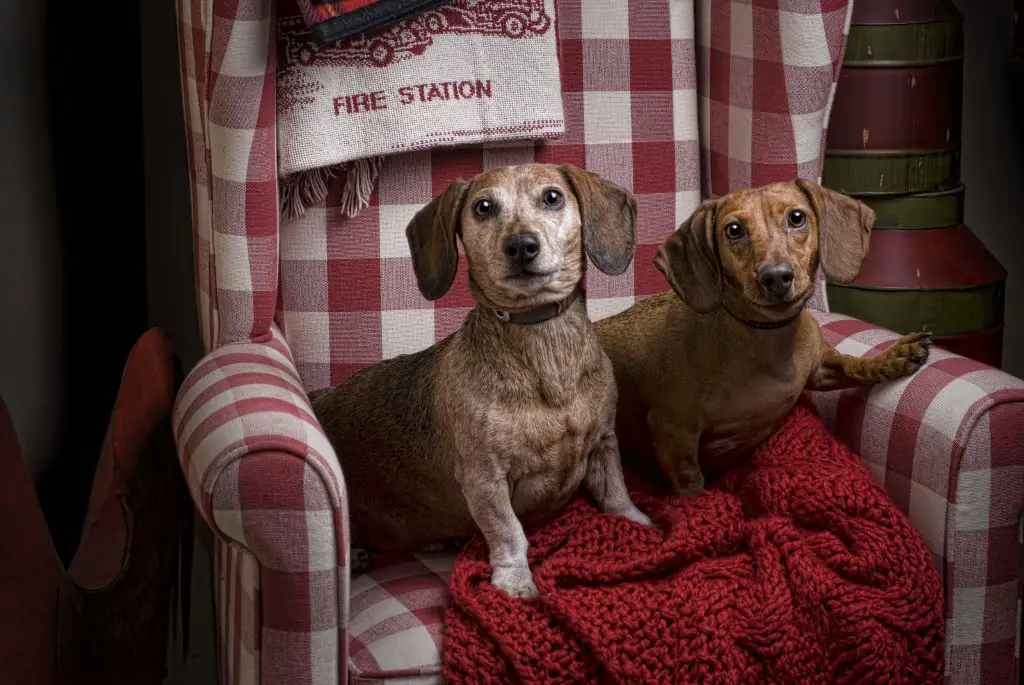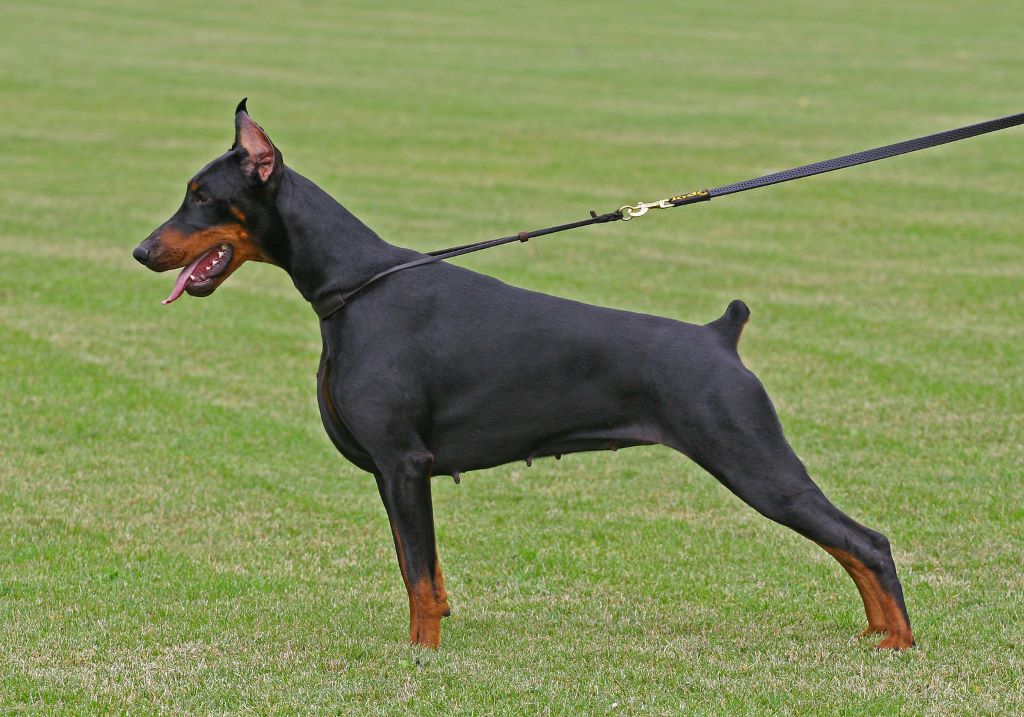Do you ever wonder why your dachshund loves to burrow under blankets? It turns out that this behavior is instinctual for the breed. Dachshunds were originally bred in Germany to hunt burrowing animals like badgers and rabbits. They have a strong desire to dig and burrow, and this behavior can manifest itself in a variety of ways.
Burrowing under blankets might be a way for dachshunds to satisfy this instinctual behavior. In the wild, dogs would burrow to stay warm and protect themselves from predators. Even though your dachshund is safe and warm in your home, this behavior is still ingrained in their DNA. While not all dachshunds will exhibit this behavior, it is common among the breed. Understanding why your dachshund burrows can help you provide them with the proper environment and toys to satisfy their natural instincts.
The Nature of Dachshunds
Dachshunds, also known as wiener dogs or sausage dogs, are a breed of dog that originated in Germany in the 15th century. They were originally bred to hunt badgers, hence their name, “badger hound.
One of the most distinctive features of dachshunds is their short legs and elongated bodies. This physical trait was specifically bred into them so that they could burrow into badger dens to catch their prey. As a result, burrowing is a core instinct for all dachshunds.
Dachshunds are also known for their lively personalities and affectionate nature. They are social pack animals by nature and enjoy being close to their human and animal companions. This can include burrowing under blankets with their owners for comfort and security.
However, their burrowing tendency can sometimes be confusing and even destructive for their owners. It’s important to understand and accommodate this instinct in order to provide a comfortable and happy home for your dachshund.
Instinctual Behavior
Dachshunds are bred to hunt, and their burrowing behavior is an instinctual trait that has been passed down through generations. Burrowing is a natural instinct for dogs, and it is not uncommon for them to want to dig or burrow into soft surfaces like blankets, pillows, or even the ground.
Dachshunds have a strong instinct to burrow, which is why they might try to dig into your bed or couch cushions. This instinct is related to their history as hunting dogs, as they were bred to hunt small animals like badgers and rabbits. To do this, they needed to be able to dig and burrow into the ground to catch their prey.
Even though dachshunds are now mostly kept as pets, this instinctual behavior remains. Burrowing under blankets or into soft surfaces might be a way for them to satisfy this instinct even when they’re living indoors.
Temperature regulation is another reason why dachshunds might burrow under blankets. Burrowing can help them regulate their body temperature and keep them warm, especially during colder months. This is particularly important for dachshunds, as they have short legs and a long body, which means they are more susceptible to getting cold.
The Hunting Heritage
Dachshunds, also known as weiner dogs, were originally bred in Germany to hunt badgers and other small prey. As a result, they have a strong hunting heritage that is ingrained in their DNA. This heritage is why they have a natural instinct to burrow and dig.
When hunting, dachshunds would use their keen sense of smell to track down prey, and then use their short legs and long bodies to easily maneuver through tunnels and tight spaces. This is why they have a natural affinity for burrowing, as it allows them to mimic their hunting behavior and feel safe and secure.
Their hunting heritage also explains why they have a strong prey drive and may be prone to chasing after small animals, such as rabbits and rodents. This can be a concern for owners, as it may put their dachshund in danger if they are not properly trained or supervised.
Overall, the hunting heritage of dachshunds is an important aspect of their behavior and personality. It is important for owners to understand and appreciate this aspect of their dog’s nature, while also taking steps to ensure their safety and well-being.
The Comfort Factor
Weiner dogs are known for their love of burrowing, and it’s no secret that they enjoy snuggling up in cozy, comfortable spots. This behavior can be traced back to their origins as hunting dogs, where they would burrow into tunnels and dens to flush out prey. However, in modern times, this instinct has translated into a love of blankets, pillows, and other soft surfaces.
If you’re a weiner dog owner, you’ve probably noticed that your furry friend has a favorite spot to rest. This could be a cave bed, a pile of blankets, or even your lap. These spots provide a sense of security and comfort for your pup, and they will often seek them out when they need to relax.
Blankets are a particularly popular choice for weiner dogs, as they provide a warm and cozy environment that mimics the feeling of being in a den. Many weiner dog owners report that their pets will burrow under blankets and pillows to create a snug and secure space for themselves. This behavior is not only adorable but also serves a practical purpose by regulating body temperature and reducing anxiety.
In addition to providing physical comfort, blankets, and other soft surfaces can also have a calming effect on weiner dogs. The texture and scent of familiar objects can help to soothe your pup and make them feel safe and relaxed. So, if your weiner dog has a favorite blanket or pillow, make sure to keep it close by for those moments when they need a little extra comfort.
Burrowing and Anxiety
If you have noticed your weiner dog burrowing more than usual, it could be a sign of anxiety. Dogs often burrow to feel safe and secure, and anxiety can trigger this behavior. Here are some things to keep in mind if you suspect your pup is burrowing due to anxiety:
-
Separation anxiety: If your weiner dog is burrowing excessively when you leave the house, it could be a sign of separation anxiety. This is a common issue among dogs and can lead to destructive behavior if left untreated.
-
Anxious behavior: Pay attention to other signs of anxiety in your weiner dog, such as shaking, whining, or panting. If you notice these behaviors along with burrowing, it could be a sign that your dog is feeling anxious.
-
Security: Burrowing provides a sense of security for dogs. If your weiner dog is burrowing more than usual, it could be because they are feeling insecure or unsafe in their environment.
-
Safety: Burrowing under blankets or pillows can also be a way for dogs to protect themselves from perceived threats. If your weiner dog is burrowing more than usual, it could be because they are feeling threatened or scared.
It is important to address any underlying anxiety issues your weiner dog may be experiencing. This can involve working with a veterinarian or animal behaviorist to develop a treatment plan. In the meantime, you can help your pup feel more secure by providing a safe and comfortable environment, plenty of exercise and playtime, and lots of love and attention.
Exercise and Energy
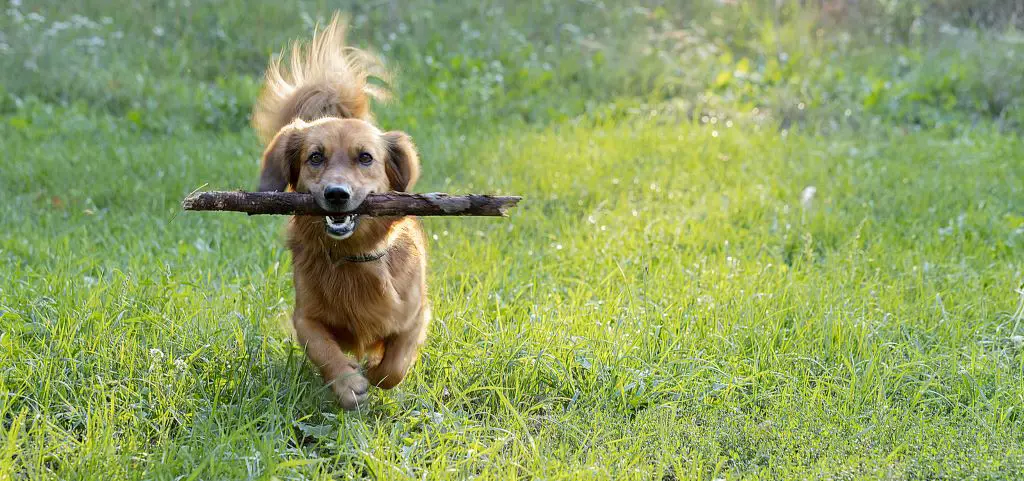
Weiner dogs are energetic and active dogs that require regular exercise to stay healthy and happy. As a responsible owner, it is important to provide them with the right amount of physical activity to keep them in good shape.
Regular exercise not only helps your dog maintain a healthy weight, but it also helps to reduce stress and anxiety, and can improve their overall behavior. A lack of exercise can lead to destructive behavior and can cause your dog to become bored and restless.
To keep your weiner dog active, you should provide them with daily walks, runs, or playtime. It is recommended that they receive at least 30 minutes of exercise each day, but this can vary depending on their age, weight, and overall health.
In addition to physical exercise, mental stimulation is also important for weiner dogs. Training and commands can provide mental stimulation and help to improve their behavior. Positive reinforcement is a great way to train your dog and encourage good behavior.
Health Implications
When it comes to your dachshund’s health, burrowing under blankets can have both positive and negative implications. Here are some things to keep in mind:
-
Temperature regulation: Burrowing under blankets can help your dachshund regulate their body temperature and keep them warm, especially during colder months. However, it’s important to make sure they don’t overheat, as this can lead to dehydration, heat exhaustion, or even heat stroke. If you notice your dachshund panting excessively or seeming lethargic, it’s time to remove the blankets and cool them down.
-
Skin and coat health: Burrowing under blankets can also lead to skin and coat issues if your dachshund isn’t groomed regularly. The warmth and moisture can create the perfect breeding ground for bacteria and fungi, leading to skin infections and hot spots. Regular brushing and bathing can help prevent these issues.
-
Anxiety and stress: While burrowing under blankets can provide comfort and security for some dachshunds, it can also be a sign of anxiety or stress. If your dachshund is burrowing excessively or seems restless, it’s important to address the underlying cause. This may involve working with a veterinarian to rule out any medical issues and implementing behavior modification techniques to help your dachshund feel more calm and relaxed.
If you have any concerns about your dachshund’s burrowing behavior or health, don’t hesitate to reach out to your veterinarian for guidance and support.
Dachshunds and Other Breeds
Dachshunds are not the only breed of dog that likes to burrow. In fact, many breeds have a natural instinct to dig and burrow, which can be traced back to their original purposes. Here are a few examples:
-
Terriers: Terrier breeds were originally bred to hunt small rodents and other prey that live underground. This required them to dig and burrow to reach their targets. Some terrier breeds that are known for their digging abilities include the Jack Russell Terrier, the Rat Terrier, and the Border Terrier.
-
Huskies: While huskies are not typically thought of as burrowing dogs, they do have a natural instinct to dig and tunnel. This is because they were originally bred to pull sleds through snow and ice, which required them to create their own paths and tunnels.
-
Pets: Even non-burrowing breeds can develop a love for digging and burrowing. This can be due to a variety of reasons, such as seeking comfort, trying to escape from the heat or cold, or simply for fun. Some breeds that are known for their love of digging include the Beagle, the Basset Hound, and the Bulldog.
It’s important to note that while digging and burrowing can be a natural behavior for some dogs, it can also be problematic if it becomes excessive or destructive. It’s important to provide your dog with appropriate outlets for their digging instincts, such as designated digging areas or toys. Additionally, training and positive reinforcement can help redirect their behavior and prevent destructive digging.
Burrowing in Different Environments
Dachshunds are known for their love of burrowing, and they will do so in various environments. Whether it is in your yard, garden, or inside your home, they will find a cozy spot to snuggle in. Here are some common environments where your dachshund might burrow:
-
Yard and Garden: Dachshunds love to dig, and they will often burrow in the soil in your yard or garden. If you have a designated area for your dachshund to dig, it can help prevent them from digging up your entire yard. However, if you don’t have a designated area, your dachshund might choose to dig wherever they please.
-
Furniture: Dachshunds are notorious for burrowing under blankets and pillows on your furniture. They love to feel cozy and secure, and burrowing under a blanket provides just that. If you don’t want your dachshund to burrow on your furniture, you can provide them with a designated bed or blanket to snuggle in.
-
Designated Area: As mentioned earlier, having a designated area for your dachshund to dig can be helpful. You can create a digging area in your yard by sectioning off a small area and filling it with sand or soil. This will give your dachshund a place to dig and burrow without destroying your entire yard.
-
Digging Area: If you don’t have a designated digging area, your dachshund might choose to dig in other areas of your yard or garden. This can be frustrating, but it is important to remember that digging is a natural behavior for dachshunds. You can try to redirect their digging behavior by providing them with toys or treats to distract them.
Weather and Burrowing
When the weather turns cold, your dachshund may seek out a warm and safe place to burrow. Their natural instinct is to dig themselves a cozy little den where they can stay warm and protected from the elements. This behavior is especially common during the winter months or in areas with extreme temperatures.
Burrowing is also a way for your dachshund to regulate their body temperature. When they curl up in a small space, it helps to conserve their body heat, keeping them warm and comfortable. This is why you may notice your dachshund burrowing under blankets or pillows on the couch or bed.
It’s important to provide your dachshund with a comfortable and safe shelter during extreme weather conditions. This can be a cozy dog bed or a crate with blankets and pillows where they can burrow and stay warm. You can also provide them with a heated dog bed or a heating pad to keep them extra warm and comfortable.
In addition to keeping your dachshund warm and safe, it’s important to monitor their behavior and make sure that their burrowing is not becoming obsessive or sporadic. If you notice any unusual behavior or excessive burrowing, it may be a sign of an underlying medical condition, and you should consult with your veterinarian.
Toys and Burrowing
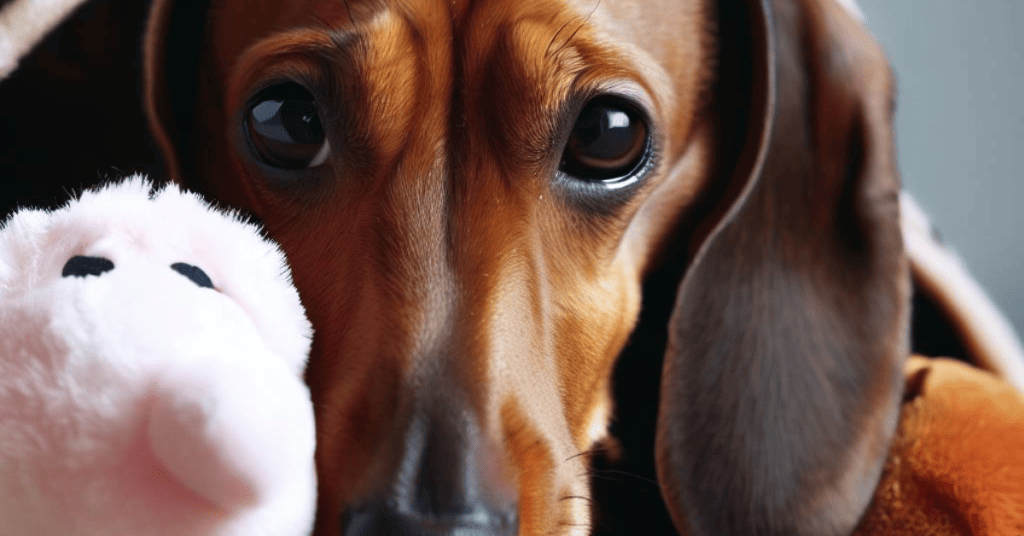
Toys can be a great way to keep your Dachshund entertained and help prevent destructive behavior. When it comes to burrowing, providing your pup with toys that mimic digging and burrowing can be especially helpful. Here are a few toy options that may help satisfy your Dachshund’s burrowing instincts:
-
Burrowing Toys: These toys come with multiple plush toys that can be hidden inside a larger toy. Your Dachshund can then dig and burrow to find the hidden toys, which can provide hours of entertainment.
-
Digging Mats: These mats are designed to simulate the feeling of digging in dirt or sand. They can be filled with treats or toys, and your Dachshund can dig and burrow to find them.
-
Tunnel Toys: These toys are designed to mimic the feeling of burrowing in a tunnel. They can be made of plush material or plastic, and your Dachshund can crawl through them or use them as a cozy place to nap.
Providing your Dachshund with these types of toys can help satisfy their burrowing instincts and prevent boredom, which can lead to destructive behavior and excessive barking. Keep in mind that not all Dachshunds enjoy burrowing, so it may take some trial and error to find the right toys for your pup.
In addition to providing toys, it’s important to make sure your Dachshund is getting enough exercise and mental stimulation. A tired dog is less likely to engage in destructive behavior or excessive barking. Consider taking your pup on daily walks or playing games like fetch or tug-of-war to help burn off excess energy.
Preventing Unwanted Burrowing
If you have a dachshund that loves to burrow, you may find yourself constantly cleaning up after them or worrying about them damaging your furniture or carpet. Fortunately, there are a few things you can do to prevent unwanted burrowing.
First, make sure your dachshund has plenty of appropriate outlets for their digging and burrowing instincts. Provide them with designated digging areas in your yard or a sandbox filled with sand or dirt. You can also give them toys that encourage digging, such as puzzle toys filled with treats or toys that can be filled with sand or dirt.
If your dachshund is burrowing to escape from something, such as loud noises or other pets, address the underlying issue. Provide them with a safe and quiet space where they can retreat when they feel anxious or scared. You can also try using calming aids, such as pheromone sprays or diffusers, to help reduce their anxiety.
Another way to prevent unwanted burrowing is to limit your dachshund’s access to areas where they are likely to burrow, such as under furniture or blankets. Use furniture covers or barriers to block off these areas, or provide your dachshund with their own designated burrowing spot, such as a cozy dog bed or crate.
Finally, if your dachshund is burrowing to escape from predators, such as coyotes or other wild animals, make sure your yard is secure and free from any potential dangers. Install a fence or barrier around your yard, and keep your dachshund supervised when they are outside.
By providing your dachshund with appropriate outlets for their digging and burrowing instincts, addressing underlying anxiety or fear issues, limiting their access to unwanted burrowing areas, and ensuring their safety from potential predators, you can help prevent unwanted burrowing and keep your dachshund happy and healthy.

